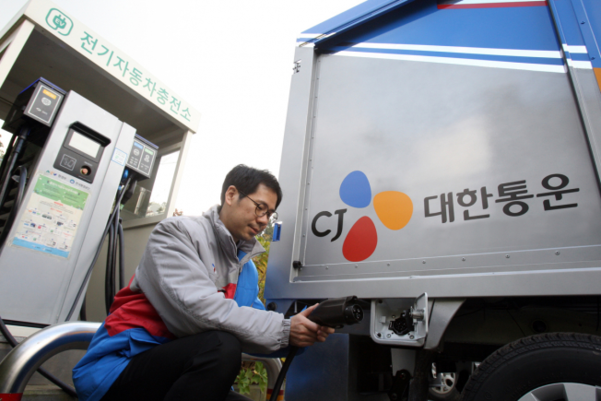Input 2021.01.07 06:00
Complaints about “time wasted charging due to insufficient charging stations”
The parcel delivery and logistics industry has been pulling back on the introduction of electric trucks in earnest from this year. In response to the government’s eco-friendly policies and consumption trends that value the environment, each company plans to introduce a small amount of electric vehicles first, start pilot operation, and then gradually increase supply.
Companies are in the position that “the eco-friendly business can no longer be postponed”, but the courier drivers complain that “it is difficult for individual drivers to cover the cost of replacing electric vehicles in a situation where the majority of drivers work with their own trucks.” The industry estimates that more than 90% of all courier vehicles are owned by courier drivers. In addition, voices such as, “In busy areas, trucks are turned on all day and carry more than 300 parcels, but electric vehicles are less efficient.”

CJ Logistics has announced a plan to replace all delivery trucks with electric trucks within 10 years. Two months ago Kia Motors (000270)The first four electric trucks made in Gyeonggi-do were put into the delivery business in Gunpo and Ulsan, Gyeonggi-do, and about 30,000 trucks operated by domestic transportation businesses, including the parcel delivery business, will be replaced by electric vehicles by 2030.
An official from CJ Logistics said, “Electric trucks have a great cost reduction effect, so we are planning to increase it in earnest from this year, and we are expanding electric charging stations in each regional delivery sub-terminal.” According to industry estimates, a 1 ton (ton) electric truck for parcel delivery can save 2 million won per year compared to diesel trucks and 1.34 million won for a 0.5 ton electric truck. However, the official said, “Because of the business structure, vehicles driven by individual couriers are not directly managed, so it is not a situation that can be forcibly changed.”
Hanjin also started the electric vehicle remodeling business. Currently, two 1t delivery trucks, each converted into an electric vehicle and a hybrid vehicle, are being operated on a trial basis in Jeju Island. An official from Hanjin said, “We plan to analyze how it can be used in the business of parcel delivery drivers after the pilot introduction by February, and we are reviewing it so that it can be put into the field after the third quarter of next year.” It is judged as a mandatory review business.”
Lotte Global Logistics, which recently increased the number of electric refrigerated trucks to nine, also announced that it plans to expand the number of electric vehicles to 200 by next year. An official from Lotte Global Logistics explained, “We are increasing the number of trucks that do not emit emissions because all of the freezer energy is supplied by electricity.”

However, the perspectives of on-site delivery drivers are different. Omo (38), a courier driver in the third year, said, “I bought a truck with a loan of 20 million won and started shipping a truck, but some subsidies come out, but it is not practically easy to change it to an electric car at another cost.” Like Mr. Oh, domestic courier drivers usually have their own trucks and sign contracts with distribution agencies. Accordingly, they are classified as individual businesses, and the contract content between the agency and the courier driver varies by region. This is the reason why companies say that “the problem of electric vehicle replacement eventually depends on the choice of courier drivers.”
There are also voices pointing out the problem of electric vehicle infrastructure that is not suitable for parcel delivery business. It is pointed out that if the electric charging infrastructure is not installed nationwide and transporting by electric freight car, it is pointed out that work inefficiency increases because time is wasted searching for charging stations or charging the car. Accordingly, an industry official said, “The cost of the courier service provider or agency, or the issue of infrastructure expansion is a matter that most companies are contemplating.” Won’t you?”
